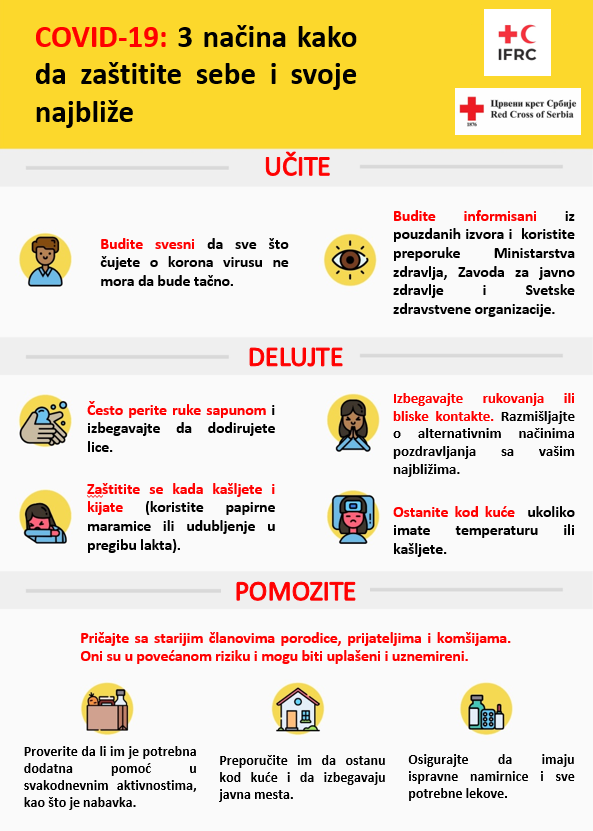Coronavirus COVID-19 – Recommendations for Older Persons
What older persons and persons with disabilities need to know
Currently available data suggest older people are twice as likely to have serious COVID-19 illness. This may be due to changes in the immune systems with age, making it harder to fight off diseases and infection. Older persons also are more likely to have underlying health conditions that make it harder to cope with and recover from illness.
In addition, persons of all ages, with or without disabilities, seem to be at higher risk for getting very sick from COVID-19 if they have serious chronic medical conditions like heart, lung or kidney disease.
Reducing exposure is especially important for people at higher risk of complications!
If you are at higher risk, these are the recommendations for you:
- Stay at home as much as possible if COVID-19 is spreading in your community and especially if you have any symptoms of respiratory infection (sneezing, coughing, shortness of breath).
- If you do have symptoms of respiratory infection, contact the epidemiology service using the numbers at the bottom of this document
- Make sure you have access to several weeks of prescribed medications in case you need to stay home for prolonged periods of time.
- When outdoors, keep your distance from persons with symptoms of disease, limit your contacts with other persons as much as possible and wash your hands as frequently as possible.
- Avoid crowds, especially indoors where there is not sufficient airflow
- Avoid travelling by airplane and public transportation vehicles as much as possible
- Plan in advance for the possibility that you or a person you regularly rely on get ill
Planning is essential
A COVID-19 outbreak could last for a long time in your community. Depending on the severity of the outbreak, local public health officials may recommend community actions designed to help keep people healthy, reduce exposures to COVID-19, and slow the spread of the disease. Creating a household plan can help protect your health and the health of those you care about in the event of an outbreak of COVID-19 in your community. You should base the details of your household plan on the needs and daily routine of your household members.
Everyday actions to prevent illness
- Frequently wash your hands with soap and water, for at least 20 seconds at a time, especially after going to the toilet, before eating and after blowing your nose, sneezing and coughing.
- If soap and water are unavailable, you can use alcohol based hand disinfectant with minimum 60% alcohol. If your hands are visibly dirty make sure to wash them with soap and water.
- Avoid touching your nose, eyes and mouth with your hands
- When coughing and sneezing do it into your elbow or in a paper tissue. Try not to cough or sneeze into your hands because you may spread the virus further. After sneezing into the tissue, throw it into garbage. If you sneeze into your hands, do not touch anything and immediately wash your hands with soap and water.
- Keep your distance from other persons, minimum 2 metres.
- Do not shake hands
- Regularly air out your apartment
- Avoid close contact with persons who have symptoms of illness
- Stay at home for your safety and health
- Clean and disinfect everything you touch frequently using the usual household disinfectants and wet wipes
- It is not recommended for persons who feel well and have no symptoms to wear masks
- Protective masks should be worn by persons with symptoms that may indicate COVID-19 infection in order to prevent others from infection. Also, wearing masks is very important for health workers and persons providing care to ill persons, like their family members.
Symptoms indicating COVID-19 infection
- COVID-19 symptoms include fever, cough, and shortness of breath. If you feel like you are developing symptoms, call your doctor.
• If you develop emergency warning signs for COVID-19 get medical attention immediately. These include:
o Difficulty breathing or shortness of breath
o Persistent pain or pressure in the chest
o Bluish lips or face
In case you have symptoms, the Ministry of health and Institute for Public Health recommend you contact the epidemiologist on duty using one of the following numbers:
Ministry of Health:
064/89-45-235
Institute for Public Health:
011/26-84-566
060/018-02-44
This list is not all inclusive. Consult medical services for any other symptom that is severe or concerning.

